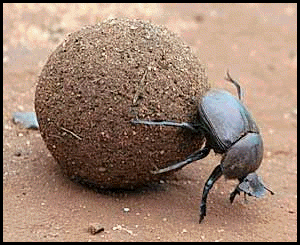
Dung Beetle

Hi:In your review of Ghosts you stated, and I quote:Kafka presented us with Gregor your solemn insurance-company drudge who, overnight, turns into a dung-beetle. The writer announces the fact on the first page, then spends the rest of the time defending his odd thesis with the details: What does a dung-beetle eat? What does he do all day? How does a family react to the breadwinner turning into a bug-on-the-wall? How does the chamber-maid react to the new tenant?
§ § § Hmmm. I don't think his exact nature is specified. Can you get away with this?
--- M. ButlerOur reviewer responds:One scholar --- Victoria Poulakis --- observed,
In the region where Kafka lived, Jewish people were often referred to, in times of persecution by anti-Semites, as Ungeziefer, or vermin. Since Kafka was himself Jewish, he was undoubtedly aware of this derogatory meaning of the word Ungeziefer --- but there's no way of knowing if he intended this meaning to apply to Gregor Samsa. Translators who feel he did intend to suggest it are more likely to use the word "vermin" in their translations; those who feel it's not an intended meaning may choose more easily-understood words like "bug" or "insect." There's no way of deciding conclusively which is the better choice. Translators have to weigh the pros and cons of the words they choose, recognizing that it's impossible to convey all levels of possible meanings in the words originally used by the story's author.
I ran into an article somewhere ... it would probably be the London Review of Books, the TLS, or the NYRB ... where a critic said that the original German word used by Kafka was "dung-beetle." But it wasn't on the first page of "Metamorphosis;" it occurs when the complaining housemaid comes into Gregor's room to clean it up, cursing him all the while.
--- Carlos Amantea